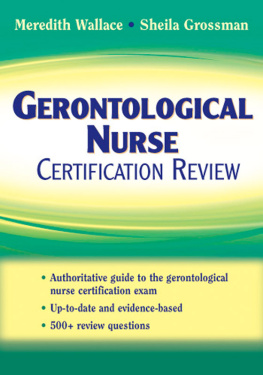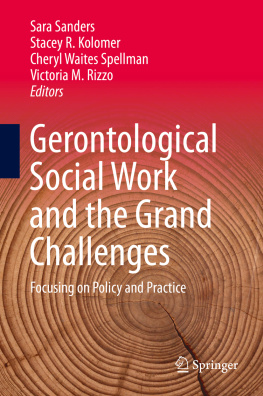GERONTOLOGICAL PRACTICE FOR THE TWENTY-FIRST CENTURY
END-OF-LIFE CARE
END-OF-LIFE CARE: A SERIES
Series Editor: Virginia E. Richardson
We all confront end-of-life issues. As people live longer and suffer from more chronic illnesses, all of us face difficult decisions about death, dying, and terminal care. This series aspires to articulate the issues surrounding end-of-life care in the twenty-first century. It will be a resource for practitioners and scholars who seek information about advance directives, hospice, palliative care, bereavement, and other death-related topics. The interdisciplinary approach makes the series invaluable for social workers, physicians, nurses, attorneys, and pastoral counselors.
The press seeks manuscripts that reflect the interdisiciplinary, biopsychosocial essence of end-of-life care. We welcome manuscripts that address specific topics on ethical dilemmas in end-of-life care, death and dying among marginalized groups, palliative care, spirituality, and end-of-life care in special medical areas, such as oncology, AIDS, diabetes, and transplantation. While writers should integrate theory and practice, the series is open to diverse methodologies and perspectives.
Joan Berzoff and Phyllis R. Silverman, eds., Living with Dying: A Handbook for End-of-Life Healthcare Practitioners
GERONTOLOGICAL PRACTICE FOR THE TWENTY-FIRST CENTURY
A Social Work Perspective
VIRGINIA E. RICHARDSON & AMANDA S. BARUSCH
COLUMBIA UNIVERSITY PRESS NEW YORK
COLUMBIA UNIVERSITY PRESS
Publishers Since 1893
NEW YORK, CHICHESTER, WEST SUSSEX
cup.columbia.edu
Copyright 2006 Columbia University Press
All rights reserved
E-ISBN 978-0-231-51071-4
Library of Congress Cataloging-in-Publication Data
Richardson, Virginia E.
Gerontological practice for the twenty-first century : a social work
perspective / Virginia E. Richardson and Amanda S. Barusch.
p. cm.(End-of-life care)
Includes bibliographical references and index.
ISBN 978-0-231-10748-8 (cloth: alk. paper)
ISBN 978-0-231-10749-5 (pbk.: alk. paper)
ISBN 978-0-231-51071-4 (e-book)
1. Social work with older people. 2. Gerontolgy. I. Barusch, Amanda Smith.
II. Title. III. Series.
HV1451.R53 2005
362.6dc22 2005048437
A Columbia University Press E-book.
CUP would be pleased to hear about your reading experience with this e-book at .
For my mother,
Marjorie F. Richardson,
July 31, 1918October 16, 2002
T HE DELIVERY OF SERVICES to older adults is a vital and expanding part of professional practice in the allied health professions. With the growth of this field has come recognition of the need for practice approaches that are empirically based and age-specific, that integrate micro and macro perspectives, and that are informed by contemporary themes in the fields of aging and social work.
This book is designed for students and professionals interested in serving older adults through direct practice. It reflects the needs that have emerged in the field, providing
empirically based, age-specific interventions
integrated micro (individual) and macro (policy-level) content
a conceptual framework that recognizes contemporary themes in aging and social work
The book is organized in four parts: discusses sociopolitical realities that affect an aging population. Case examples are used throughout the text to integrate and illustrate specific interventions.
, respectively.
).
In ).
).
Many gerontology practitioners will struggle to apply these interventions effectively in demanding work settings that will require them to prioritize their work according to their clients and agencys resources. Many age-specific interventions described here will require modification as the baby boomers and younger cohorts age. We encourage others to supplement and expand on what we present here. We focus on the most vulnerable older people, but we celebrate the many older people who age successfully. Although we focus on social workers, other gerontological practitioners can modify the interventions described here in accordance with their clients needs and their professional requirements.
VIRGINIA E. RICHARDSON
Many people contributed to the development of this book. I am grateful to Rick Reamer, who approached me about writing the book and provided many excellent suggestions. Connie Corley read each chapter and offered specific feedback that enhanced the substance of the book. John Michel believed in and supported this project from the beginning, and this book was conceptualized, organized, and written under his direction and encouragement. I am especially grateful to Amanda Barusch, a gifted scholar, who collaborated with me on this project. Her integrity, enthusiasm, and commitment, more than anything else, resulted in the completion of this project. Dean Tony Tripodi of Ohio State University encouraged this project at every phase. Polly Kummel, an outstanding copy editor, substantially improved the books clarity. Other colleagues who provided support include Shantha Balaswamy, Christine Price, Sandy Sullivan, and Gil Greene.
My family supported the writing at every stage. My older sister, Dr. Barbara Richardson, sent me daily e-mails to keep me on track during the most difficult periods. I cant thank her enough for her unconditional support. My younger sister, Janice Snowden, also provided unconditional support in numerous ways. I am forever indebted to them. I love and appreciate my daughter, Nikki Thomas, for boosting my spirits, making me smile, and teaching me about life while I worked on this. No one deserves more recognition than my husband, Michael Thomas, who read and edited every chapter and learned more about aging than he wanted. His love, generosity, and humor forced me to keep the book in perspective. I dedicate this book to my mother, Marjorie Richardson, to my mother-in-law and father-in-law, Joy and Gerald Thomas, and to all older people, who deserve as much quality of life as anyone.













